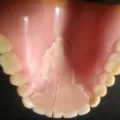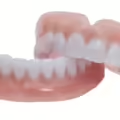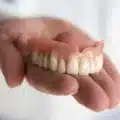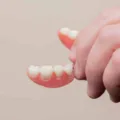Que se passe-t-il pendant un regarnissage dentaire ? : les faits que vous devez savoir
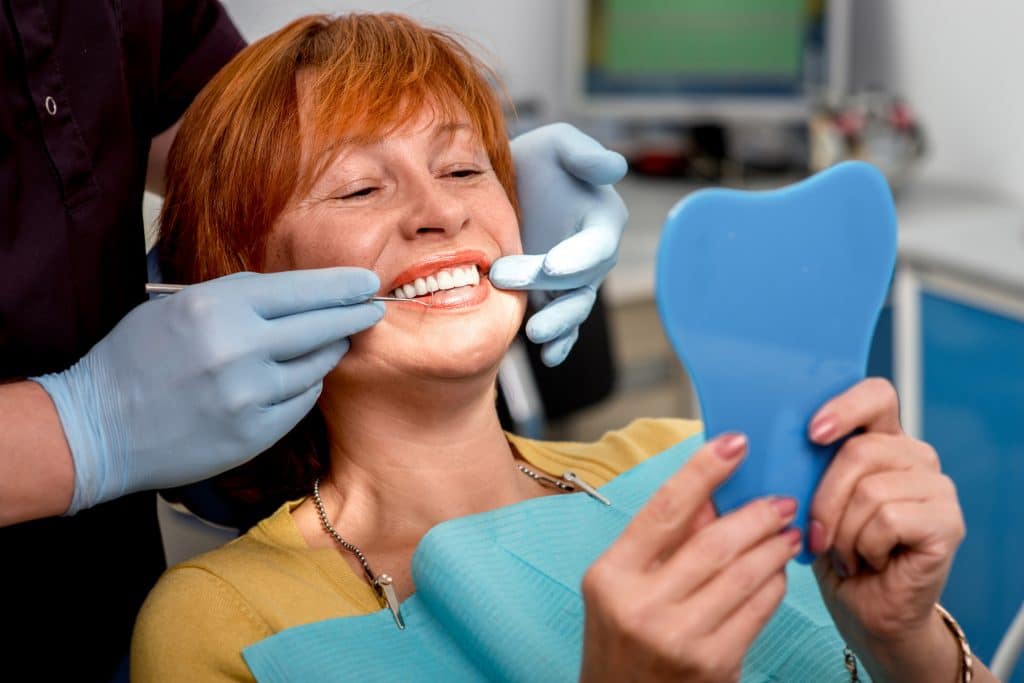
Vous pensez avoir besoin d'un regarnissage dentaire, mais vous ne savez pas exactement de quoi il s'agit et si vous en avez besoin ? Les regarnissages dentaires sont souvent une procédure dentaire négligée, mais ils peuvent aider votre prothèse à s'adapter plus confortablement.
Dans 2019, 41,23 millions d'Américains portaient des prothèses dentaires et ce nombre est en augmentation.
Si vous faites partie des millions d'Américains qui portent des prothèses dentaires, vous savez qu'un ensemble bien ajusté est la clé d'une vie quotidienne confortable et confiante.
Alors, ne vous inquiétez pas, nous sommes là pour vous. Dans ce guide, nous vous expliquerons ce qui se passe lors d'un regarnissage dentaire et comment cela peut vous aider à améliorer votre niveau de confort.
Lisez la suite pour plus d'informations:
Qu'est-ce qu'un regarnissage dentaire ?
Un regarnissage dentaire est une procédure simple qui peut aider votre prothèse à s’adapter plus confortablement. Voici ce que vous devez savoir sur la procédure, y compris ce qui se passe lors d'un regarnissage dentaire et combien de temps cela prend.
Un regarnissage dentaire « rafraîchit » essentiellement l'ajustement de votre prothèse en créant une nouvelle base ajustée sur mesure. Cela peut être particulièrement utile si vous avez remarqué que votre dentier glisse ou frotte contre vos gencives, provoquant une gêne.
Lors d'un regarnissage dentaire, votre dentiste retirera d'abord tout matériau existant de la base de votre prothèse. Ils prendront ensuite une empreinte de votre bouche et l'utiliseront pour créer une nouvelle base sur mesure pour votre prothèse.
L'ensemble du processus prend généralement environ une heure.
Après un regarnissage dentaire, vous devrez peut-être vous réadapter au port de votre prothèse pendant quelques jours. Cependant, vous devriez remarquer une amélioration significative de l'ajustement et du confort de votre prothèse.
Si vous avez des questions ou des préoccupations, assurez-vous de parler à votre dentiste.
Comment savoir si j'ai besoin d'un regarnissage dentaire ?
Si votre prothèse glisse, frotte ou vous fait mal, vous aurez peut-être besoin d'un regarnissage dentaire. Un regarnissage signifie simplement que votre dentiste ajustera l'ajustement de votre prothèse.
Cela se fait en ajoutant plus de matière sur les surfaces intérieures de vos prothèses, ce qui leur donne une meilleure adhérence et les rend plus confortables à porter.
Que se passe-t-il lors d'une procédure de regarnissage dentaire ? Un regarnissage dentaire se déroule généralement en deux rendez-vous.
Lors du premier rendez-vous, votre dentiste prendra des empreintes (moules) de votre bouche afin de fabriquer des doublures sur mesure pour votre prothèse.
Ces doublures seront faites de matériaux souples ou durs, selon ce qui vous convient le mieux. Vous reviendrez ensuite pour un deuxième rendez-vous pour faire poser et coller les doublures sur votre dentier.
Après la procédure, et une fois que le matériau de regarnissage a été ajouté à votre prothèse, vous devrez peut-être vous adapter pour les porter à nouveau. Il est normal de ressentir un certain inconfort ou des douleurs pendant les premiers jours.
Assurez-vous de suivre les instructions de votre dentiste sur la façon de prendre soin de vos prothèses dentaires pendant cette période. Avec des soins appropriés, vos prothèses rebasées devraient vous procurer des années de confort.
Si vous pensez avoir besoin d'un regarnissage dentaire, parle à ton dentiert. Ils peuvent vous aider à déterminer si un regarnissage vous convient et vous guider tout au long du processus afin que vous sachiez à quoi vous attendre.
Combien coûtera un regarnissage dentaire ?
Il existe deux principaux types de regarnissage dentaire : au fauteuil et en laboratoire. Le regarnissage au fauteuil est généralement plus cher que le traitement en laboratoire.
En effet, cela se fait en une seule visite et ne nécessite pas l'utilisation de mastic dentaire. Le regarnissage traité en laboratoire peut être couvert par une assurance dentaire, alors assurez-vous de vérifier auprès de votre fournisseur avant de subir la procédure.
Le type de matériau utilisé pour le regarnissage affecte également le coût. Par exemple, la résine de la couleur des dents est généralement plus chère que les matériaux traditionnels comme le métal ou le plastique.
Cependant, la résine de la couleur des dents peut donner un aspect et une sensation plus naturels. En fin de compte, la meilleure façon de déterminer le coût d'un regarnissage dentaire est de consulter votre dentiste.
Il ou elle peut vous aider à choisir le type de regarnissage adapté à vos besoins et à votre budget.
Que se passe-t-il lors d'un regarnissage dentaire ?
Comment fonctionne un regarnissage dentaire ? Un regarnissage dentaire est une procédure simple effectuée en deux rendez-vous. Tout d'abord, votre dentiste prendra des empreintes (moules) de votre bouche afin de fabriquer des doublures sur mesure pour votre prothèse.
Ces doublures seront faites de matériaux souples ou durs, selon ce qui vous convient le mieux. Vous reviendrez ensuite pour un deuxième rendez-vous pour faire poser et coller les doublures sur votre dentier.
Après la procédure, une fois que le matériau de regarnissage a été ajouté à votre prothèse, vous devrez peut-être vous adapter pour les porter à nouveau. Il est normal de ressentir un certain inconfort ou des douleurs pendant les premiers jours.
Assurez-vous de suivre les instructions de votre dentiste sur la façon de prendre soin de vos prothèses dentaires pendant cette période. Avec des soins appropriés, vos prothèses rebasées devraient vous procurer des années de confort.
Le regarnissage dentaire est-il douloureux ?
Le regarnissage dentaire est une procédure relativement simple et indolore. Il est souvent utilisé pour réparer les dommages aux prothèses dentaires ou pour améliorer l'ajustement des prothèses dentaires mal ajustées.
La procédure consiste à prendre une empreinte de l'intérieur de votre bouche, puis à créer un nouveau revêtement sur mesure pour votre prothèse.
Cette nouvelle doublure sera fabriquée à partir d'un matériau doux et flexible qui se moulera à l'intérieur de votre bouche, offrant un ajustement confortable et confortable.
Vous pouvez ressentir un certain inconfort ou une douleur après la procédure, mais cela est normal et devrait disparaître en quelques jours. Si vous ressentez une douleur qui dure plus de quelques jours, assurez-vous d'en parler à votre dentiste.
Qu'est-ce que la procédure de réglage du regarnissage souple ?
La procédure d'ajustement du regarnissage souple est une procédure simple et non chirurgicale qui est généralement effectuée dans le cabinet de votre dentiste.
Votre dentiste retirera tout matériau existant de la base de votre prothèse et prendra une empreinte de votre bouche pour créer une nouvelle base sur mesure. L'ensemble du processus prend généralement environ une heure.
Après un regarnissage souple, vous devrez peut-être vous réadapter au port de votre prothèse pendant quelques jours ; cependant, vous devriez remarquer une amélioration significative de l'ajustement et du confort de votre prothèse.
Cette procédure est un excellent moyen d'améliorer l'ajustement des prothèses dentaires mal ajustées et de les rendre plus confortables à porter.
Qu'est-ce que la procédure d'ajustement du regarnissage dur ?
La procédure d'ajustement de regarnissage dentaire dur est une procédure simple et non chirurgicale qui est généralement effectuée dans le cabinet de votre dentiste. Lors d'un regarnissage dur, votre dentiste enlèvera tout matériau existant à la base de votre prothèse.
Ils prendront ensuite une empreinte de votre bouche et l'utiliseront pour créer une nouvelle base sur mesure pour votre prothèse. L'ensemble du processus prend généralement environ une heure.
Après un regarnissage dur, vous devrez peut-être vous réadapter au port de votre prothèse pendant quelques jours. Cependant, vous devriez remarquer une amélioration significative de l'ajustement et du confort de votre prothèse.
Un regarnissage dur peut vous donner un ajustement plus sûr, ce qui peut vous permettre de manger et de parler plus facilement. Il peut également aider à prévenir l'irritation et la douleur des gencives.
En ce qui concerne le regarnissage dentaire dur ou souple, la décision finale doit vous appartenir.
Combien de temps dure le traitement ?
La durée d'un regarnissage dentaire dépend de plusieurs facteurs. Tout d'abord, cela dépend du type de regarnissage utilisé.
Il existe des regarnissages temporaires et permanents, et le regarnissage temporaire ne dure généralement que quelques mois tandis que le regarnissage permanent peut durer plusieurs années.
Deuxièmement, cela dépend de la façon dont vous prenez soin de vos prothèses dentaires. Assurez-vous de suivre les instructions de votre dentiste sur la façon de prendre soin de vos prothèses dentaires afin qu'elles durent le plus longtemps possible.
Enfin, cela dépend aussi de la fréquence à laquelle vous portez votre dentier. Si vous ne les portez qu'occasionnellement, ils dureront généralement plus longtemps que si vous les portez tout le temps.
Avec des soins et un entretien appropriés, votre regarnissage dentaire peut durer plusieurs années et fera plus que justifier le coût.
Cela affectera-t-il mon discours ?
Un regarnissage dentaire est une procédure courante qui peut aider à améliorer l'ajustement de votre prothèse. Bien que la procédure elle-même soit relativement simple, il est important de s'assurer qu'elle est effectuée correctement pour éviter toute complication.
Une complication potentielle est une altération de votre discours. Cependant, cela n'est généralement que temporaire et devrait se résoudre de lui-même en quelques jours.
Si vous ressentez des changements dans votre discours après la procédure, assurez-vous d'en parler à votre dentiste afin qu'il puisse faire les ajustements nécessaires. Avec des soins appropriés, un regarnissage dentaire peut être un moyen efficace d'améliorer l'ajustement de votre prothèse et de vous aider à profiter d'une meilleure santé bucco-dentaire.
Cela me donnera-t-il mauvaise haleine ?
Si vous envisagez de faire un regarnissage dentaire, vous vous demandez peut-être si cela vous donnera mauvaise haleine. La réponse est non.
Un regarnissage peut aider à améliorer votre haleine en vous assurant que votre prothèse est bien ajustée et qu'elle ne contient aucune particule alimentaire.
Avoir des prothèses dentaires mal ajustées peut provoquer une accumulation de bactéries et de particules alimentaires, ce qui peut entraîner une mauvaise haleine. Mais avec un regarnissage, vos prothèses seront plus ajustées et ne fourniront pas de terrain fertile pour les bactéries.
Donc, si vous vous inquiétez de la mauvaise haleine, un regarnissage dentaire peut être exactement ce dont vous avez besoin.
Quels sont les risques ?
Il existe quelques risques associés aux regarnissages dentaires, mais ils sont rares. Ces risques comprennent :
Réaction allergique au matériau de rebasage
L'un des risques associés à l'obtention de prothèses dentaires est une réaction allergique au matériau de regarnissage. Il s'agit d'un matériau utilisé pour fabriquer la base de la prothèse, et il peut contenir du latex ou d'autres substances pouvant provoquer une réaction allergique.
Un autre risque est que la prothèse ne soit pas bien ajustée et puisse se déplacer dans votre bouche, ce qui peut entraîner des douleurs et une irritation des gencives.
De plus, si vous avez des gencives sensibles, portez des prothèses dentaires mal ajustées ou ne nettoyez pas votre prothèse régulièrement, vous risquez de développer une stomatite, qui est une inflammation des muqueuses de la bouche.
Bien que ce soient tous des risques potentiels associés aux prothèses dentaires, il est important de se rappeler qu'ils sont rares et que la plupart des personnes qui portent des prothèses dentaires ne rencontrent aucun problème.
Infection
L'infection est l'un des risques les plus courants associés à tout type de chirurgie. Il est important de comprendre que l'infection peut survenir à n'importe quel moment du processus de guérison.
Même si le site d'incision semble bien cicatriser, il existe toujours un risque que des bactéries pénètrent dans la plaie et provoquent une infection. Il existe plusieurs façons de contribuer à réduire le risque d’infection, notamment :
- Garder le site d'incision propre et sec
- Changer régulièrement les pansements
- Éviter l'exposition à la saleté et aux surfaces contaminées
- Prendre des antibiotiques tel que prescrit par votre médecin
Cependant, même avec ces précautions, il y a encore un petit risque qu'une infection se développe. Les symptômes d'une infection comprennent la rougeur, l'enflure, la chaleur, le drainage de la plaie et la fièvre.
Si vous ressentez l'un de ces symptômes, il est important de contacter immédiatement votre médecin afin que vous puissiez commencer le traitement. Avec un traitement rapide, la plupart des infections peuvent être résolues sans complications graves.
Dommages aux dents ou aux prothèses dentaires
Les porteurs de prothèses dentaires peuvent être exposés à un risque accru de problèmes de santé bucco-dentaire. Des prothèses dentaires mal ajustées peuvent frotter et irriter les gencives, provoquant des plaies ou des infections.
De plus, cette situation peut rendre difficile de manger et de parler, ce qui peut conduire à la malnutrition et à l'isolement social. Les prothèses dentaires qui ne sont pas correctement nettoyées peuvent également héberger des bactéries, ce qui peut entraîner parodontite.
Bien que les porteurs de prothèses dentaires doivent veiller à nettoyer régulièrement leur prothèse et à consulter leur dentiste pour des examens réguliers, ils doivent également être conscients des risques potentiels associés au port de prothèses dentaires.
En comprenant les risques, ils peuvent prendre des mesures pour réduire leur risque de développer des problèmes de santé bucco-dentaire.
Alors, avez-vous besoin d'un regarnissage dentaire ?
Si vous avez besoin d’un regarnissage dentaire, assurez-vous de prendre rendez-vous avec votre dentiste. Ils seront en mesure de vous dire si un regarnissage est la meilleure option pour vous et pourront vous guider tout au long du processus.
Pour plus d'informations sur les rebasages dentaires et d'autres sujets liés aux prothèses dentaires Contactez-nous et nous serons heureux de vous aider!
Achetez des prothèses complètes en ligne.

